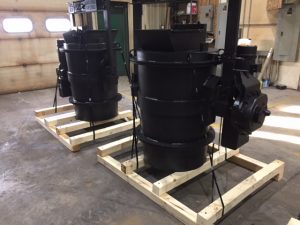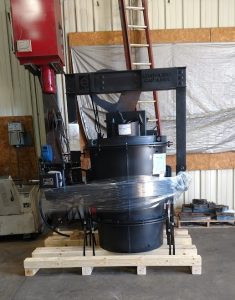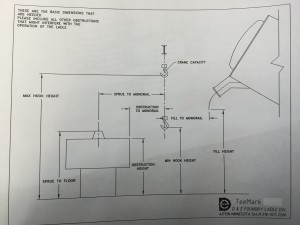Process Ladles – Ladles Designed By Foundrymen For Foundrymen
Tight Cover Ductile Iron Treatment Ladles
Sandwich Process Ductile Iron Treatment Ladles
Tight Cover™ Mark IV Ductile Iron Treatment Ladles
![]() Spec Sheet – Tight Cover Ductile Iron Treatment Ladles
Spec Sheet – Tight Cover Ductile Iron Treatment Ladles
Plant Dimensions click here to print the picture show below.
Reduced Alloy Costs
In an open ladle, up to 70% of the magnesium present in the alloy is lost into the atmosphere in a great cloud of magnesium oxide vapor. Because the Tight Cover ladle is a closed vessel, very little oxygen is present during the reaction. The Mg vapor remains in the ladle environment instead of being lost as MgO. As the ladle fills, this Mg is stirred back into the bath.
Alternative to Emission Control
Under good process controls, the magnesium oxide emissions from our Tight Cover ladles is less than 5% of that of an open ladle. The ladle has been accepted in a number of states as an alternative to dust collection in the treatment of ductile iron. The savings of the initial cost and upkeep of a dust collection system are quite substantial.
Elimination of Cover Material
D&E’s Tight Cover ladle is a designed to coordinate the fill time with the reaction time for optimum Mg recovery. Cover steal used in open ladles to delay the Mg reaction is not recommended because it throws off this critical time and reduces the ladle’s efficiency. Savings include not only the material and handling costs of the cover material, but also the energy costs to melt and superheat it.
Controlled Venting
During the reaction the Mg boils, generating a pressure of over 200 psi. The Mark IV ladle has a controlled venting system to assure safety and excellent recoveries.
Energy Savings
Because the Tight Cover ladle is covered and insulated its head loss is about half that of an open ladle. Tap temperatures can be reduced by as much as 100 Degrees F. In many cases these lower tap temperatures mean an increase in the number of tons that can be melted.
Removable Bottom
The Tight Cover Ladle has a removable bottom allowing refractory in the reaction zone to be repaired without removing the good refractory in the upper part of the ladle. Order a spare bottom to have lined and ready for hot or cold changes whenever needed.
No Slag Build-Up
The large pour-out spout lets you remove slag each time the ladle is emptied without having to turn the ladle upside down.
Longer Fade Time
The limited amount of oxygen in the closed vessel increases fade time. Because of reduced heat loss and increased Mg fade time, iron can be held longer in the D&E TIGHT COVER™ ladle, avoiding pigging and pour packs that delay production.
Improved Product Quality
The simple fact that the operator cannot see the metal level inside the covered ladle, means that the iron must be measured (usually weighed) as it is poured into the ladle. The iron is metered into the ladle through a critically sized orifice to optimize the magnesium reaction. These factors, along with the increased Mg fade time, greatly increase control over the treatment process and result in improved quality, a more consistent produce, and reduced scrap.
Size Range
Standard sizes range from 600 to 20,000 pounds iron capacity. Larger and special sizes are available.
![]() Spec Sheet – Porous Plug Mixing Ladles – Downloadable/Printable PDF
Spec Sheet – Porous Plug Mixing Ladles – Downloadable/Printable PDF



